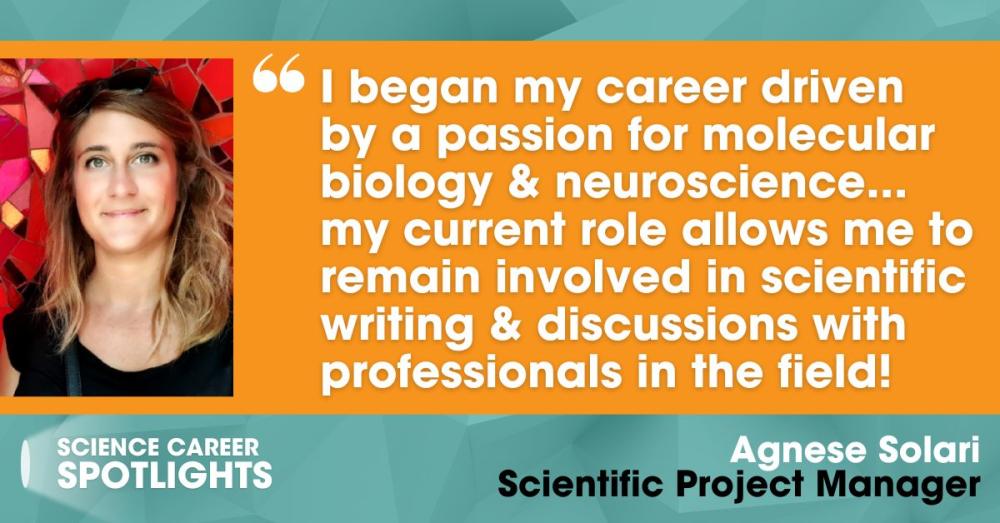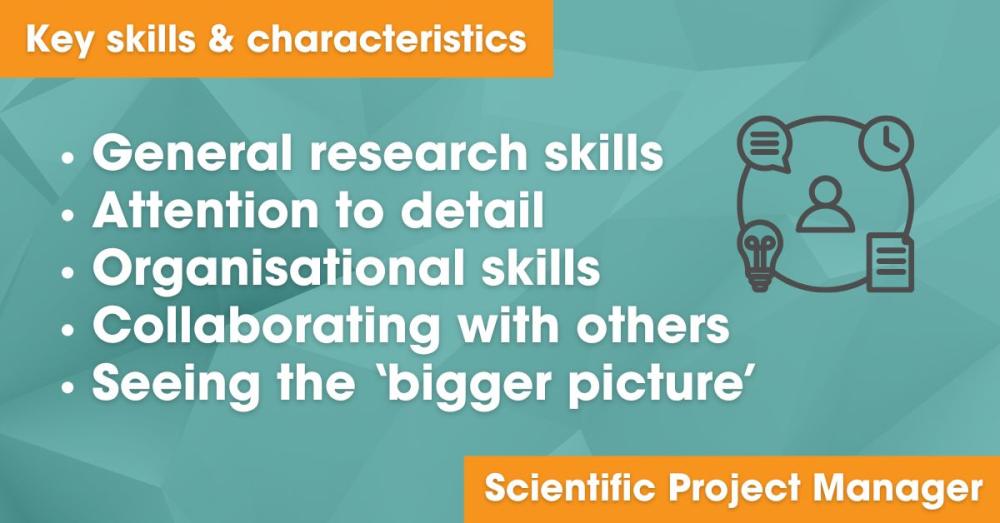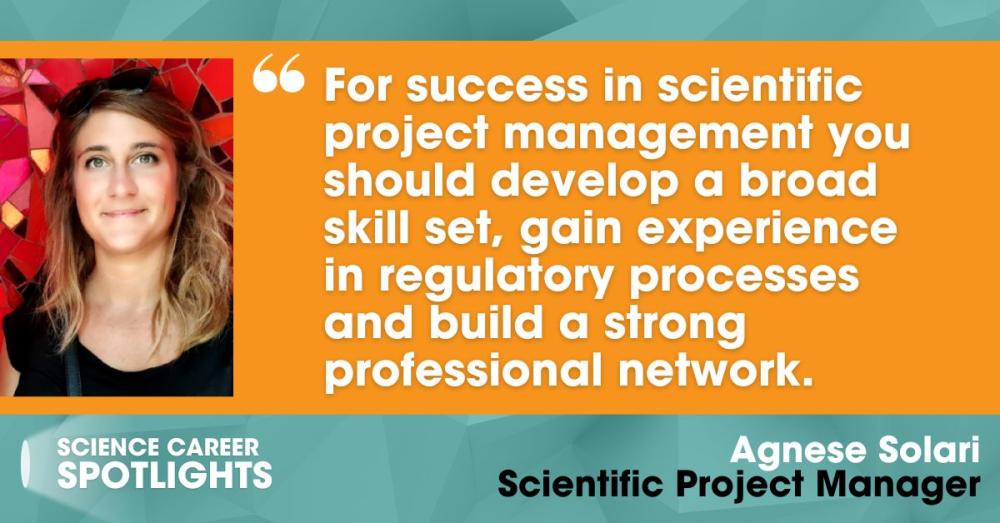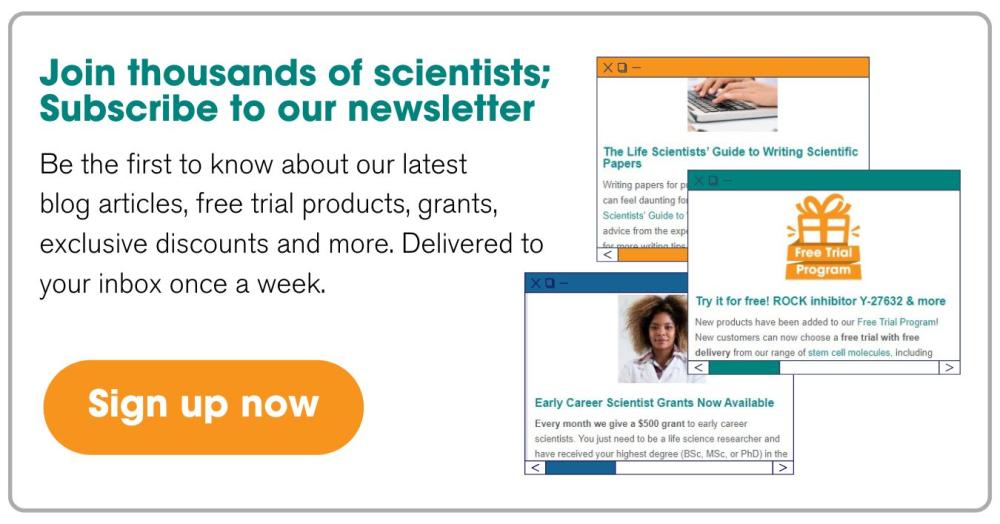Career Spotlights: Scientific Project Manager
In our new Science Career Spotlights series, we’re having great conversations with scientists about their unique career journeys! We dig deep into their early career plans, the decisions they’ve made along the way, and the skills they’ve found most useful for the jobs they do now. They also share valuable advice for early career scientists who hope to follow a similar path some day.
Next in our series is Agnese Solari, a Scientific Project Manager at Pharmadoc! We first spoke to Agnese 7 years ago when she was a third year PhD student researching cancer stem cells in human primary brain tumours. Her career path may have taken her away from the bench and into a more corporate role, but we were keen to find out how her early research skills are now invaluable for collaboration as part of an interdisciplinary team of pharmaceutical professionals.
In this great interview, she shares what it takes to transition from academia into an industry role, and the most important skills and qualities you’ll need if you want to succeed as a Scientific Project Manager.
THE ROLE
What does your current job role involve?
Agnese: As a Scientific Project Manager at Pharmadoc I am responsible for coordinating and organizing projects, and working closely with pharmaceutical and biomedical industries. Primarily, I manage the regulatory and procurement processes for new drugs and medical devices, and I also provide training for the key account managers of pharmaceutical companies.
What do you enjoy most about the role?
Agnese: What I enjoy most about my work is the opportunity to stay up-to-date with the latest advancements in the biomedical and scientific fields, as well as the chance to work on multiple projects simultaneously. These projects vary not only from a scientific or conceptual perspective—for example, new drugs for emerging therapeutic indications—but also in terms of their structure. Some projects involve web-based or in-person meetings with professionals from the medical and pharmaceutical sectors, leading to the creation of scientific documents. Others focus on evaluating the latest clinical studies and comparing new drugs with those already available on the market.
THE ROUTE
What were your early career goals?
Agnese: I began my science career driven by a strong passion for molecular biology and neuroscience. My primary goal was to contribute, in my own small way, to clinical research and advance to better understand how to fight against cancer stem cells. One of my objectives was to progress in academia and eventually share new discoveries and knowledge with others. In a way, my current role allows me to continue this path, as I am still involved in scientific writing and discussing the latest discoveries with clinical professionals, pharmacists, and others in the field!
What route has your career taken? Were there many unexpected twists along the way?
Agnese: Yes, my career path has taken some unexpected turns. After completing my PhD, due to a lack of funding and limited opportunities for postdoctoral positions, I had to move to a different lab and was unable to continue the research I had started during my doctoral studies. I started a six-month research grant in another lab and later I won a postdoc position in another lab. While I gained new knowledge and techniques, the constant need to change environments and the lack of long-term stability led me to seek more professional and financial security in an industry role.
How difficult did you find the transition from academia to a role in industry?
Agnese: For me, the transition from academia to a role in industry was not particularly difficult. Fortunately, my colleague, who had tutored me and coordinated the scientific department, had a career path almost identical to mine. She was able to guide me on how to change my mindset and put it into practice.
Where did you look to find career opportunities in industry? e.g. websites, networking, personal connections, etc.
Agnese: I spoke with some of my former classmates from university, and they recommended several LinkedIn pages to explore for career opportunities in industry.
What have been the biggest challenges or decisions you’ve faced in your career?
Agnese: One of the biggest challenges has been reinventing myself after several years in research. There were many new things to learn, with less hands-on work in the lab but more human professional interaction. This included engaging with clients whom my company is consulting, as well as collaborating with key professionals in the healthcare and pharmaceutical sectors.
THE SKILLS
Which transferable skills have been the most useful in your career so far?
Agnese: The most useful transferable skills in my career so far have been my ability to conduct thorough research and pay attention to detail, as well as my organizational skills. These skills have allowed me to manage complex projects effectively and ensure high-quality outcomes in my work.
Which qualities would you say are essential for success as a Scientific Project Manager?
Agnese: I’ve partially answered this question in the previous one, but additionally, I think it's essential to understand the client's desires and needs in order to align with the overall project goals. It’s important to have a comprehensive view of the situation while also keeping the focus on the specific objectives.
THE ADVICE
What’s the best piece of career advice you’ve ever received?
Agnese: The most useful piece of career advice I’ve ever received is to gather as much information as possible from my scientific supervisor, given their experience. I was also encouraged to take the initiative and learn through hands-on experience, while being mindful of my responsibilities.
What advice would you give to an early career scientist who hopes to become a Scientific Project Manager one day?
Agnese: My advice to an early career scientist interested in becoming a Scientific Project Manager would be to focus on developing a broad skill set. This includes honing your communication and organizational skills, as well as gaining experience in project management and regulatory processes. It’s also important to build a strong professional network within the scientific and pharmaceutical communities.
THE FUTURE
What has been the proudest moment of your career to date?
Agnese: For the first part of my career, my proudest moments were defending my PhD thesis and presenting my research results through posters and oral presentations at several important international congresses. In my new career, I take pride in being able to interact with authoritative and professional figures and coordinating expert meetings. Additionally, concluding projects and seeing the publication of a scientific document that I contributed to as a writer has been very rewarding.
How do you see your career progressing from here? Where do you see yourself in 10 years?
Agnese: Who knows... that’s a tough question! One of my goals will be to gain even more autonomy and authority in the field, and to come up with some innovative ideas for the development of new projects.
________________________________
More career advice from Hello Bio
For more advice on STEM career options and opportunities, take a look at some of these other great articles on the Hello Bio blog:
- Career Spotlights: Commissioning Editor
- Career Spotlights: Lecturer in Neuroscience
- The Life Scientists’ Guide to Applying for Jobs in Industry
- STEM Career Paths for Life Scientists - guest blog by Dr Joanne Kamens
- Academic vs. Non-Academic Science Careers (and choosing the right path)
- Cultivating a Creative Career in Scicomm - guest blog by Dr Renaud Pourpre
- We asked our scientists: what’s the best career advice you’ve ever had?
- To Science, or Not To Science? Alternative Careers For PhDs - guest blog by Dr Lucka Bibic
Share your STEM career story!
Would you like to share your STEM career story with the Hello Bio blog? Did you have an interesting or unusual journey into science? Could your career path inspire others who are not sure what to do next? Get in touch via email to be featured in our Science Career Spotlights series - hello@hellobio.com
________________________________
If you enjoyed this article, why not check out the other resources available on our blog. We are passionate about supporting life scientists including early career life scientists and PhD students - with really low-priced reagents, antibodies and biochemicals, early career scientist grants, and resources to help with both personal and professional development. We know how tough it is - so we hope you find these helpful!
More General Support for Life Scientists
For advice on wellbeing, dissertations, presenting at conferences, wellbeing, PhD support, networking and lots more, we have a huge range of articles to help - just click below:
Save up to 50% on our high purity reagents...
When you get to the stage of planning your experiments, don't forget that we offer a range of low-cost, high-purity agonists, antagonists, inhibitors, activators, antibodies and fluorescent tools (yes - they really are around half the price of other suppliers!) You can use our Quick Multi-Search Tool to search for lots of products in one go, and the range includes:
- Enzyme inhibitors and activators
- Chemogenetic ligands
- Ion channel modulators
- GPCR & ionotropic receptor ligands
- Cell biology reagents & biochemicals
Technical resources
Try our Molarity Calculator: a quick and easy way to calculate the mass, volume or concentration required for making a solution.
Try our Dilution Calculator: an easy way to work out how to dilute stock solutions of known concentrations
We also offer a comprehensive range of technical resources including antibody protocols and methods, product guides and mini-reviews:
And finally, don't forget to check back in with our blog regularly for our latest articles. If there’s something you’d love to contribute to the community, whether that’s an interview or article, drop us a line at hello@hellobio.com
---






















